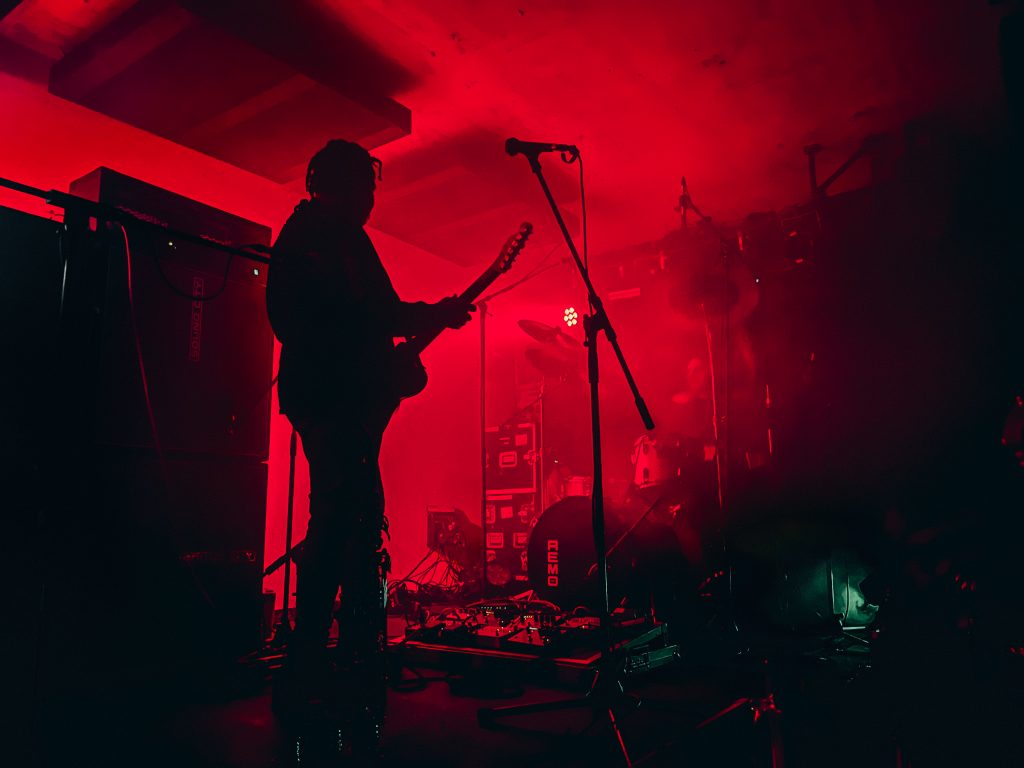
R E L E A S E S
Basic
- Released: March 2017
- Format: LP, Digital
- Label: DERO Arcade (DOR-00)
Abomination
- Released: February 2018
- Format: LP, Digital
- Label: DERO Arcade (DOA-007)
Gas Lit
- Released: January 2021
- Format: LP, Digital, CD
- Label: Invada Records (INV251LP)
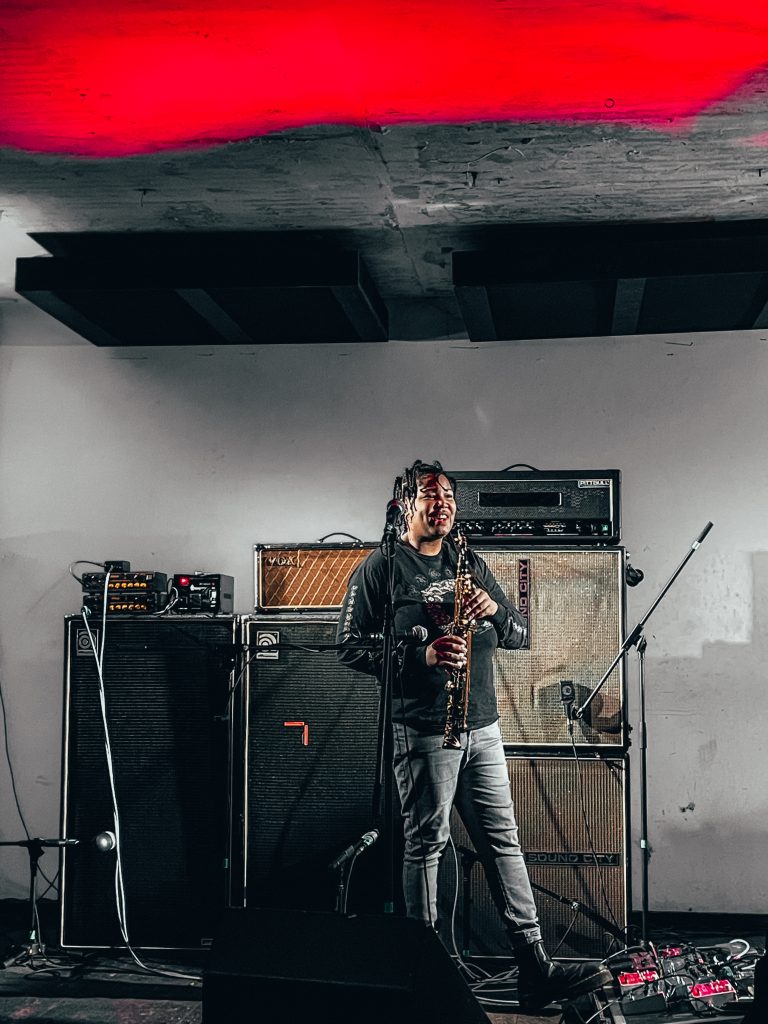
I N T E R V I E W
Interview with Takiaya Reed
In a land shadowed by a dark & oppressive past of white supremacy, the deep rooted sounds emitted from Takiaya’s guitar call upon the strength of Indigeneity to divide and dissolve the resonance of superiority and the heavy percussion (played by Olvia) beat out any lingering hidden notions of hate and replace it with emotions of oneness. It was on this cold winter evening in Berlin, in which Decolonoize was graced with the opportunity to interview Divide and Dissolve on their last show of their European ‘Gaslit’ tour.
As we arrived at Urban Spree, we were greeted by Takiaya with such warmth and openness, we hung around for sound check and got a preview of the sheer amazing talent on stage, Takiya on guitar and saxophone and Olivia on percussion. Soundcheck was a mere foreshadowment of the awe striking performance to precede just a couple of hours later.
It was an intriguing yet relaxed experience to interview Takiaya, as it added even more depth and understanding when indulging in the deep sonic trip of the instrumental doom metal band. As we sat down on tattered couches backdropped by graffiti painted walls , Takiaya spoke about how Divide and Dissolve aim to destroy colonial barriers & white supremacy by their intimidating clever sounds.
Decolonoize: How do you compose songs, What is your process?
Takiaya: It’s very – I thought about this a lot, the composition process is a lot like us just chilling, just relaxing a lot. The actual music part is very fast. But there is something else involved in the preparation before it is just us like having fun and being relaxed. We are both really chilled people.
Decolonoize: Are you jamming together or just hanging out?
Takiaya: Hanging out…. It’s a lot of …
Decolonoize: And then you start and just play or do you come out with an idea?
Takiaya: The first 2 albums were written in two days. It’s a lot of not playing – it’s a lot of spaciousness in the music and the writing process as well.
Decolonoize: It has more depth actually. What changed on the last album?
Takiaya: Oh yeah…laughs…and says “our producer Ruben said “ hey y’all should go away somewhere, Im sending you to a place to go write this album, and that is what actually happened”.
Decolonoize: So you just chilled there?
Takiaya: Yeah that’s what happened. And then we had the outcoming album that’s coming out that was written in New Orleans. And that was an interesting writing process, cos we had access to a rehearsal space. Because we are so loud, we needed a specific place to play and the people whose practice space it was only had availability at 7 or 8 am, a few days a week over 3 weeks. And also during the time it was Mardi Gras I was partying till 7 am. (laughs) and then I would go to band practice (laughs). It was also a quick and condensed writing process.
Decolonoize: Wow, you have very long songs written in a very short writing process?
Takiaya: Sometimes or rather most of the times, I believe in this, that things should just be easy. Like, when you know you are just feeling something, this feels just right, it’s usually because it is right and that is how art should be, for me it doesn’t have to be… art should not be forced. Forcing art feels like against some kind of Spiritual practice or something. And me and Sylivie are deeply linked to each other in so many realms, especially with our indigeny, we just chill. We are not forcing anything.
Decolonoize: I’m actually very interested in the indigenous part becauseI think there is a whole spiritual part in it where music comes from nature. It just comes out. How does it incorporate into your music? How do you feel about it?
Takiaya: It’s how people experience our music with time, something happens with time because time is so deeply non-linear. It is about the intention behind the music and how it is linked to nature and our ancestors. People can just feel it, it is not a question mark, it just is, because that is our bond that we are sharing with other people which feels really important.
Decolonoize: Thank you for sharing that. What do you prefer most: Studio time rehearsing, studio time recording or being on tour? What’s your favorite?
Takiaya: OK here is the thing, this music was meant to be experienced mostly live. With touring you can hear how rounded the music is and they can be kicked in the chest. Even if they don’t have an expensive sound system. But the studio takes this very live piece of music and then they kill it. And then they insert live back into it. And you have this flattened thing that was so round. And then you’re inflating air into it and then it leaks holes. So i think i’m really into touring even though it’s a little bit challenging (laughs) but really fun ultimately. Yeah, I am in love with playing music, but whatever I will do, I like it all (laughs).
Decolonoize: Great answer! I have another question: what is your experience on being a BIPoC musician?
Takiaya: That’s a great question, would you mind being a little more specific?
Decolonoize: Like in the alternative music scene where it is predominantly male white CIS guys. As a Non white person, how do you feel?
Takiaya: I honestly feel really relaxed. I don’t have a tendency to … This music is very focused and centered on what it is centered on and has very strong messaging, people know what they are coming to get usually, so I feel really relaxed in that. And in addition to that it is useful when there is less loneliness in your experience, so I … for the future am hoping that my experience is less niche and I would like for other people to feel less lonely in their experience but im feeling grateful.
Decolonoize: That is wonderful. Do you think there is something lacking in this alternative scene? Do you miss something?
Takiaya: Yes, absolutely. Music is very inaccessible at times and any system under capitalism and within colonization every system will be lacking, so music is not exceptional right now. It’s hard to make art and live in this society and have to pay your bills and rent and be free enough to create – yeah sometimes it’s hard. I wish I had a trust fund. (laughs)
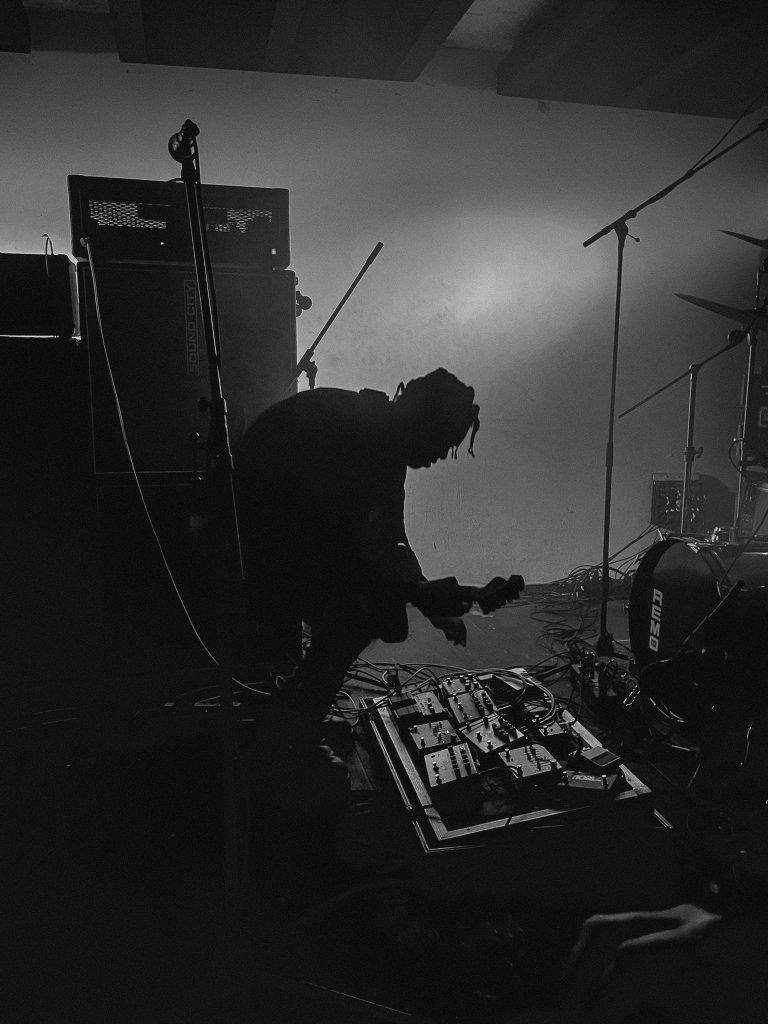
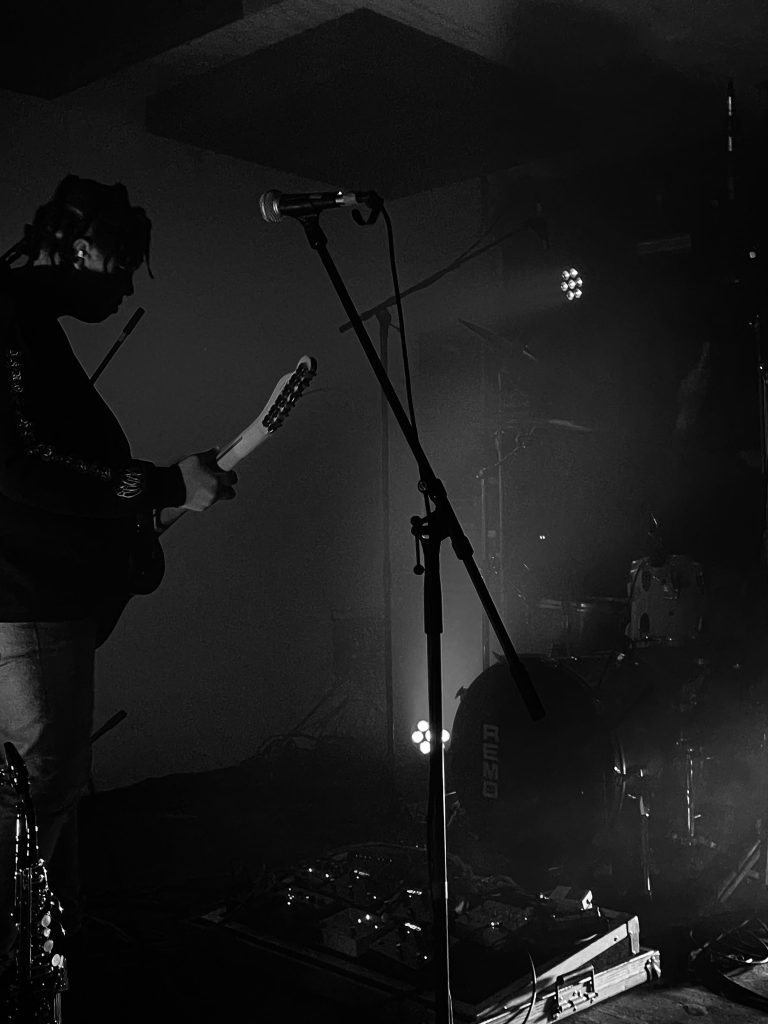
Decolonoize: What’s your Top 3 advice for a healthy and mentally sustainable tour? 3 things that you do that help?
Takiaya: Oh, I fortunately have the best tour manager in the world, Marcus is amazing because he helps me have good boundaries. Because I try to make myself available to everyone, but he’s just literally “you can’t do that.” And then number two, I am calling my friends a lot, like every day. Because when I go home I just don’t want people to forget that I exist, because it’s hard when you are on tour a lot because people sometimes forget about you and then your friends are like “you are never here” but I’m like “im home..Im really excited to meet you”.
So I call my friends so they dont forget about me, and that makes it really sustainable. I think it’s really important to nourish your existing relationships. And number 3 is going on walks and eating good food, because that’s really good and makes you happy. It doesn’t really take much to make me happy, because I’m really relaxed. I’m not miserable on tour, and some people are so miserable and hate it so much.
I am learning so much about these people who cannot tour because it’s so awful and sure, it’s been a long time and this drive is lasting forever and my body hurts but I feel grateful to be able to be on tour and doing what I love. And like with anything that is amazing that you love it is important to have good boundaries. I am grateful that my booking agent here is so good at booking us which makes life easier and more sustainable as well. It takes your whole entire team to make everything easier.
And when your team is rooting for you and that makes your load lighter as well, with some people that believe in you.
Decolonoize: Was it always like this or was it a process to find these people?
Takiaya: A process for sure. 100%.
Decolonoize: Do you see an evolution on the Alternative scene regarding inclusivity for BIPoC and FLINTA?
Takiaya: Yeah! Look at you! Excuse moi?
Decolonoize: (laughing) but you’ve been to other cities too on this tour.
Takiaya: Cuz I keep meeting people like y’all. We are everywhere. We literally…are
Decolonoize: Decolonizing the scene?
Takiaya: Yes, definitely, it’s really important, it’s happening everywhere and it’s more and more people.
Decolonoize: Is there a difference between Australia and Europe in the scene?
Takiaya: Yeah, it’s similar but different. In Australia mostly everyone speaks english, but that just does something to a place. And Australia is basically as big as Europe, but here is crossing all these borders. There is so much intensity, culture, language, everything is changing here. Yeah it’s different. You were talking about the scene?
Decolonoize: Yeah also
Takiaya: But this influences everything. It has an impact on everything. Yeah, many differences.
Decolonoize: Do you have anything to say to the people that are gonna read this? Good advice for musicians? BIPoC Musicians?
Takiaya: I have no advice. Please continue to play music. Don’t give up.
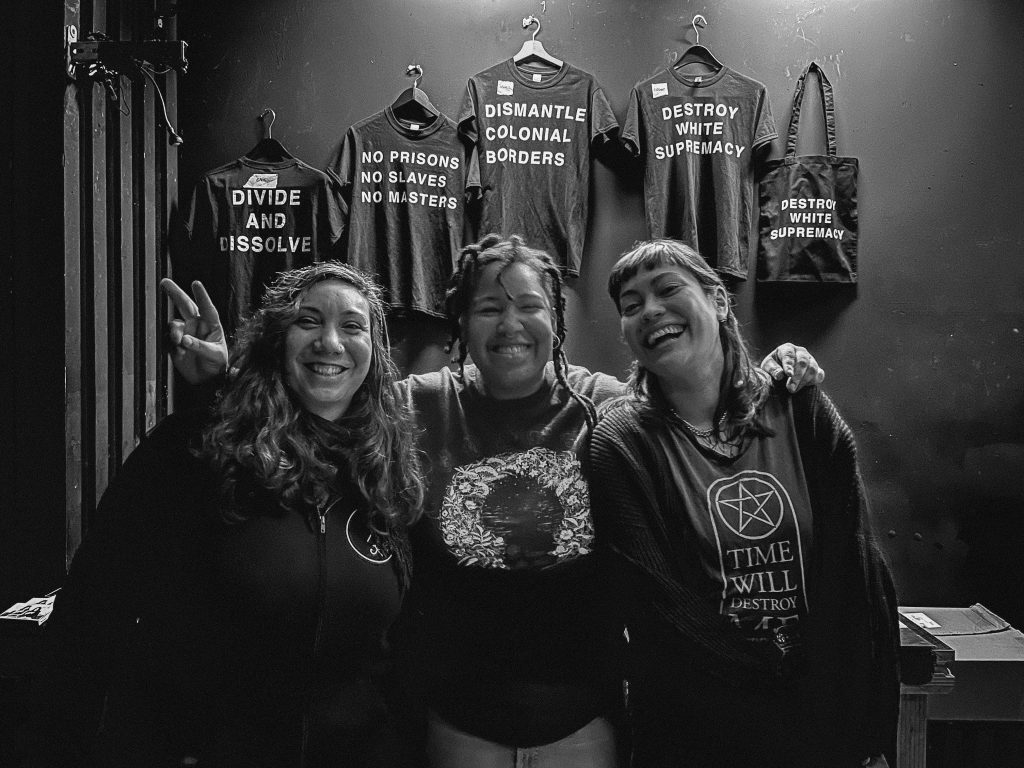
Thank you Takiaya!
Interview by Kim and Mdt